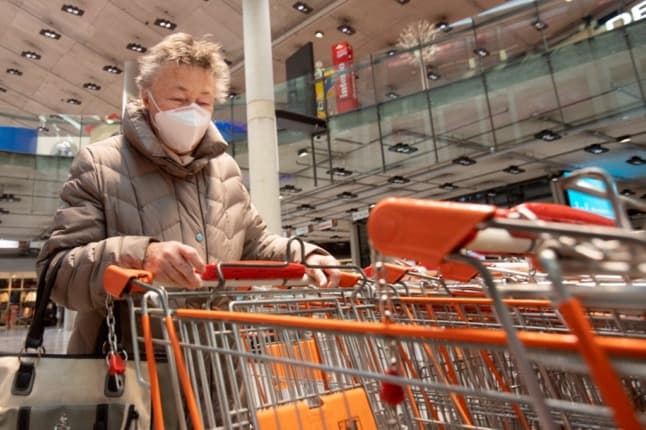Stagflation: Austrian economy 'slowing down' as inflation remains high

After the strong expansion in the first half of 2022, the Austrian economy is now in a downturn phase, according to the Austrian Institute of Economic Research.
The economic slowdown is spreading to all value-adding sectors, the Austrian Institute of Economic Research (WIFO) said.
The manufacturing sector is even likely to slip into recession, it added. Real GDP is expected to grow by 4.8 percent in 2022 and roughly stagnate in the following year (2023 +0.2 percent).
With inflation remaining high in 2023, Austria's economy is heading for stagflation, when the inflation rate is increasing as economic growth slows, for the first time since the 1970s.
READ ALSO: From inflation to Covid: What to expect from Austria’s winter season
The negative results are highly influenced by the energy crisis, but Austria will be less affected than some of its neighbours.
"Due to its higher natural gas intensity, rationing as a result of possible supply shortages is likely to hit the German economy harder than the Austrian economy", says Christian Glocker, one of the authors of the current WIFO forecast.
READ ALSO: UPDATED: How reliant is Austria on Russia for energy?
Economic growth after the pandemic is slowing down
The widespread lifting of the COVID-19 measures by the authorities has temporarily given a strong boost to the services sector and private consumption in particular.
However, "this effect is now expiring", Wifo said.
"Now the dampening forces from the international environment will have a stronger impact on the overall economy", it added.
As the global economy weakens, it clouds the outlook for domestic goods exports and thus for industry and investment in Austria. At the same time, the marked increase in world market prices for raw materials, energy and intermediate goods keeps domestic price inflation high and causes real income losses that dampen private consumption.
READ ALSO: EXPLAINED: How Austria’s new finance measures could benefit you
"However, government spending to support consumption counteracts this.", Wifo added. Austria's federal and state governments have announced several support packages to cushion the effects of the economic crisis to the public, as The Local reported.
Under these conditions, Austria's economy will still expand by 4.8 percent in 2022 and thus grow more strongly than in the previous year (2021 +4.6 percent). In the following year, however, the momentum is likely to slow down considerably (2023 +0.2 percent), the economists said.
The forecast flattening of economic momentum will only have a delayed impact on prices, with inflation expected to rise to 8.4 percent in 2022 and weaken only slightly to 6.6 percent in 2023 - bringing Austria to stagflation for the first time since the 1970s.
Comments
See Also
The economic slowdown is spreading to all value-adding sectors, the Austrian Institute of Economic Research (WIFO) said.
The manufacturing sector is even likely to slip into recession, it added. Real GDP is expected to grow by 4.8 percent in 2022 and roughly stagnate in the following year (2023 +0.2 percent).
With inflation remaining high in 2023, Austria's economy is heading for stagflation, when the inflation rate is increasing as economic growth slows, for the first time since the 1970s.
READ ALSO: From inflation to Covid: What to expect from Austria’s winter season
The negative results are highly influenced by the energy crisis, but Austria will be less affected than some of its neighbours.
"Due to its higher natural gas intensity, rationing as a result of possible supply shortages is likely to hit the German economy harder than the Austrian economy", says Christian Glocker, one of the authors of the current WIFO forecast.
READ ALSO: UPDATED: How reliant is Austria on Russia for energy?
Economic growth after the pandemic is slowing down
The widespread lifting of the COVID-19 measures by the authorities has temporarily given a strong boost to the services sector and private consumption in particular.
However, "this effect is now expiring", Wifo said.
"Now the dampening forces from the international environment will have a stronger impact on the overall economy", it added.
As the global economy weakens, it clouds the outlook for domestic goods exports and thus for industry and investment in Austria. At the same time, the marked increase in world market prices for raw materials, energy and intermediate goods keeps domestic price inflation high and causes real income losses that dampen private consumption.
READ ALSO: EXPLAINED: How Austria’s new finance measures could benefit you
"However, government spending to support consumption counteracts this.", Wifo added. Austria's federal and state governments have announced several support packages to cushion the effects of the economic crisis to the public, as The Local reported.
Under these conditions, Austria's economy will still expand by 4.8 percent in 2022 and thus grow more strongly than in the previous year (2021 +4.6 percent). In the following year, however, the momentum is likely to slow down considerably (2023 +0.2 percent), the economists said.
The forecast flattening of economic momentum will only have a delayed impact on prices, with inflation expected to rise to 8.4 percent in 2022 and weaken only slightly to 6.6 percent in 2023 - bringing Austria to stagflation for the first time since the 1970s.
Join the conversation in our comments section below. Share your own views and experience and if you have a question or suggestion for our journalists then email us at [email protected].
Please keep comments civil, constructive and on topic – and make sure to read our terms of use before getting involved.
Please log in here to leave a comment.